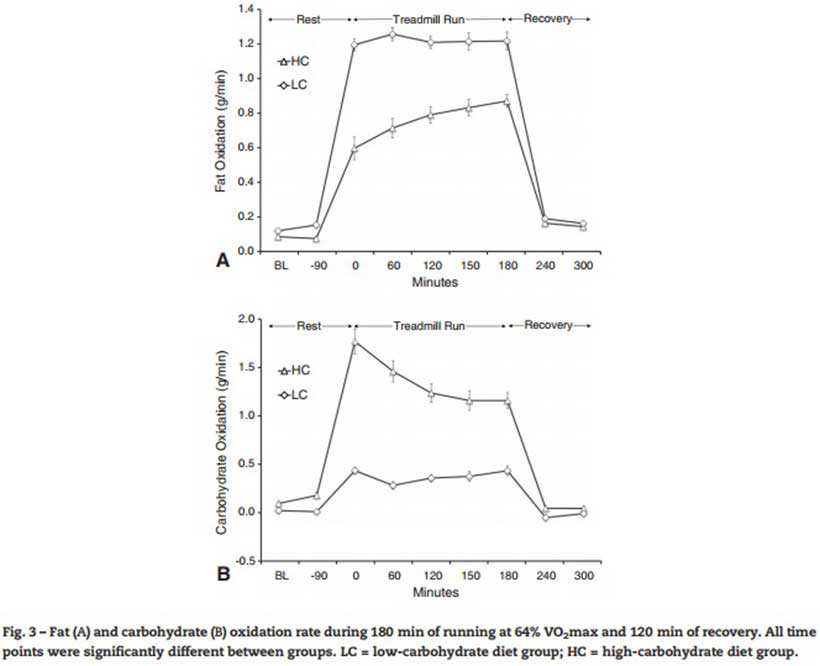
You may have heard that glucose is essential for energy.
Furthermore, there’s a common message that we need hundreds of grams of carbohydrate per day if we are physically active.
However, this isn’t strictly true, and the idea of carbs being essential for energy is incorrect.
In fact, some research asserts that being keto-adapted can have substantial performance benefits in sports and for athletes.
This article provides a guide to keto-adaptation, the performance benefits ketone bodies may have, and the limitations.
What is Keto-Adaptation?
Keto-adaptation simply refers to the period during which we “adapt” to a ketogenic diet.
After years—or perhaps even decades—of following a high carbohydrate diet, our body optimizes itself to burn glucose for energy.
In short, the primary energy source has been glucose for a long time; we can’t just flip a switch and instantly start burning fat.
Take the abundant stores of glucose away, and there’s bound to be an adjustment period.
During this adaptation time, a low carbohydrate intake depletes the body’s glycogen stores.
Glycogen is a storage form of energy in the muscles and liver, and it is the first place your body will look for fuel.
However, once the glycogen stores are empty, the body will begin to produce ketones for energy. The liver will also upregulate the number of fat-burning enzymes to better utilize all the dietary fat coming in.
Ketosis and Keto-Adaptation
Once the body starts using ketones for fuel, we enter a state known as “ketosis.”
On the downside, many people feel kind of “off” or even sick until they can efficiently burn fat.
As a result, symptoms such as headaches, nausea, tiredness, and fatigue are not uncommon. Many people refer to these common side effects as “low carb flu” or “keto flu”.
It’s important to realize that being “in ketosis” and fully keto-adapted are not the same.
The hardest part of starting a ketogenic diet will always be the first week, due to the initial flu-like symptoms.
However, gaining the full performance benefits of keto-adaptation will take somewhere between three weeks and a couple of months.
How Long Does it Take To Become Keto-Adapted?

Firstly, we are all slightly different biochemically and regarding our metabolic state.
Becoming a “fat burner” involves large-scale metabolic changes, and the body does need time to accustomize.
For some people, the adaptation period might be quick and painless, while for others it may take a little longer.
One thing worth pointing out is that each individual’s keto-adaptation “timeline” somewhat depends on their actions.
For instance, if you are feeling lousy, tired, and craving carbs then this is an urge you should resist.
On the other hand, if you can’t resist temptation, then it will only delay the keto-adaptation process.
Unfortunately, some people get stuck in a negative cycle. For example, they want to try a ketogenic diet but eat carbs whenever they start feeling a lack of energy.
After this, they feel guilty and try to start a keto diet again…. and then the cycle continues.
Don’t try a ketogenic diet unless you’re ready and willing to restrict carbohydrate seriously.
Keto-Adaptation Period
A recent study involving respected low-carb researchers Dr. Phinney & Dr. Volek found that (1);
- It takes a few weeks for glycogen stores to deplete, at which stage ketone production “increases dramatically.”
- Fat-adaptation—the ability to oxidize fat for energy—increases progressively with time.
How Can You Tell If You’re in Ketosis?
After the first week of keto and possible flu-like symptoms, it is common to notice more energy and a cleaner feeling of focus.
However, if you want to be (more) sure you are in ketosis, then there are a couple of ways to find out.
The first is to use ketone strips.
There is a guide on how to use ketone strips here.
These are very cheap, but not always the most accurate.
A second option is a ketone blood meter (disclosure: affiliate link), which is higher in accuracy and price.

The Performance Benefits of Being Keto-Adapted
It’s overwhelmingly believed that optimal sporting performance requires large amounts of carbohydrates.
In this regard, the Academy of Nutrition and Dietetics suggests that, depending on activity levels, athletes should aim for the following levels of carbohydrate intake (2):
| Intensity and Duration | Carbohydrate Requirement (per pound of body weight) |
| Low-intensity, moderate duration | 2.3 – 3.2 grams |
| High-intensity, moderate to high duration | 3 – 4.5 grams |
| High-intensity races and an extreme training load | 3.6 – 5.5 grams |
For example, according to the Academy of Nutrition and Dietetics, a 180lb marathon runner should be consuming between 648 grams and 990 grams of carbohydrate per day.
This carb-fuelling idea is the traditional view of what an athlete needs.
But is endurance running on keto possible?
According to the latest research, there are many benefits of burning fat for energy.
Some assert that it may even be more beneficial than carbohydrate fueling. But is there any evidence for that claim?
What Do Studies Say?
Over the past few decades, more and more studies are investigating the possible benefits of being a fat-adapted athlete.
Here is one of the most significant;
Metabolic characteristics of keto-adapted ultra-endurance runners
This 2015 study shows that long-term keto-adapted athletes have a 2.3x higher rate of fat oxidation than high carbohydrate athletes (3).

Additionally, despite a very low carbohydrate intake, the keto-adapted athletes were able to maintain normal glycogen levels throughout a 180-minute run.
Further Studies
Some more study findings which support the performance benefits of a ketogenic diet include;
- Low carbohydrate diets and performance: Both low-carb and low-fat diets have performance benefits, but low carbohydrate diets elicited a greater reduction in body weight and fat than energy-equivalent diets (4).
- Rethinking fat as a fuel for endurance exercise: The ketone body beta-hydroxybutyrate acts as a signaling molecule and it is capable of altering gene expression and enhancing performance. Additionally, entering nutritional ketosis accelerates the body’s ability to oxidize fat progressively (5).
- Ketogenic diet does not affect strength performance in elite gymnasts: This study demonstrates that there was no significant strength difference between gymnasts on a western diet or a ketogenic diet. Further, over 30 days the keto gymnasts had a decrease in body weight and fat mass despite a (non-significant) increase in muscle mass (6).
- Effects of a short-term carbohydrate-restricted diet on strength and power performance: 31 participants went on a carbohydrate-restricted ketogenic diet (<5.4% carbs) for seven days. During this period, the participants had a significant decrease in body weight while maintaining strength and power (7).
- Capacity for moderate exercise in obese subjects after keto-adaptation: Moderately obese participants on a ketogenic diet lost an average of 10.8kg weight over eight weeks. After six weeks of the diet, participants maintained blood glucose and glycogen levels while undertaking exhausting exercise (8).
- In addition to these findings, ketogenic diets also have a range of indirect benefits which can affect performance. A couple of these include increasing satiety and encouraging stable blood sugar levels throughout the day (9, 10).
What Does This Mean?
Despite these impressive findings on ketogenic diets for performance, it is worth remembering that there is no one-size-fits-all diet.
Higher carbohydrate diets also have a lot of evidence behind them for sporting performance.
However, this data does show that the idea of high-carb diets being the only choice for athletes isn’t true.
Myths About Physical Performance in Ketosis
There are a couple of myths regarding sporting performance and keto;
1. Some assert that a ketogenic diet is unsuitable because we need glucose to fuel strenuous exercise.
However, our body is very capable of making its own glucose in the absence of exogenous (dietary) glucose.
This process is known as gluconeogenesis.
Gluconeogenesis is a metabolic pathway in which the body synthesizes glucose from non-carbohydrate sources such as dietary amino acids, glycerol, and lactate (11).
In other words, fat-adapted athletes can utilize energy both from glucose (through gluconeogenesis) and ketones.
The rate of gluconeogenesis increases as athletes progressively become more adapted to a carbohydrate-restricted diet.
As shown in the studies on ketogenic diets and performance, keto-adapted athletes can maintain blood glucose and glycogen levels even during intense exercise.
This is not the case for those in the beginning stages of a ketogenic diet.
2. Several studies show impaired physical performance in athletes following a keto diet, so carbohydrate is necessary for sporting performance.
There are studies which show ketogenic diets can impair physical performance.
However, these are very short in duration and last for one or two weeks.
One of the more extended studies, which was a 3-week intervention, found that while the diet increased fat oxidation, it impaired overall performance (12).
The critical point here is that becoming adapted to keto takes time. Specifically, a three-week intervention isn’t long enough to gain the full performance benefits.
As stated earlier on, much of the benefits from becoming keto-adapted occur after three weeks and become more pronounced with time (1).
How to Become Keto-Adapted Quickly and Easily
While it’s not always straightforward, becoming a fat-adapted athlete can be much more comfortable if we follow some general rules;
- Don’t fear fat: increasing the amount of dietary fat is the priority – don’t fear it! Fat (aside from ultra-processed oils and margarine) is an entirely healthy nutrient that provides energy. In the absence of dietary carbohydrate, it’s imperative to consume enough.
- Don’t give in to carb cravings: Feeling hungry during the adaptation? Then keep some snacks on hand and use them if you start getting cravings. After entering ketosis, these cravings should subside, and satiety improves a lot.
- Get enough electrolytes: Ensure adequate consumption of the minerals magnesium, potassium and sodium. When we restrict carbohydrate, insulin levels and glycogen stores fall which causes the body to lose water (and accompanying electrolytes). As a result, increasing our electrolyte intake during this time is important.
Final Thoughts
Despite the studies mentioned in this article, research on ketogenic diets and sporting performance is at an early stage.
Further, carbohydrate-fueling and traditional sports nutrition strategies have a greater evidence base at this time.
However, ketogenic diets are certainly a viable alternative for athletes to consider.
They do appear to have some intriguing benefits which progressively increase with the degree of keto-adaptation.
It would be interesting to see further longer-term studies in this area to see how ketogenic diets compare to carbohydrate-fueled nutritional strategies.
At the end of the day, there’s no one diet that’s a perfect fit for everyone.
And that goes for athletes too.


I got to lose 160Lbs., I’m going to do a no bread, no pizza, no sugar, and add Grandma’s words “eat in moderation”, and do a brisk walk. Cept I can’t walk, so I will ride my bike.
Good luck with it!
I have a problem with eating disorders not anorexic like I used to be haha will this cause any problems?
Hi Anna,
This is probably something which is best to discuss with your doctor!
Personally, I don’t see any reason why it would, but I’m not sure of your personal situation.
Michael, as a researcher in the area and someone who teaches on the topic I have to say your article is superb. Well researched, nicely explained in a way that can be understood and addressing the silly myths we often hear. Fantastic work.
Thanks, Andrew!
I do think that many people dismiss the idea of fat for fuel even though there is still little research on it. Likewise, it shouldn’t be pushed as the most evidence-based option at this time.
Very informative and relevant. I am new to ketogenic diet now i am clear with my doubts.
Thanks – hope it helps!